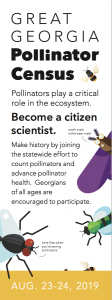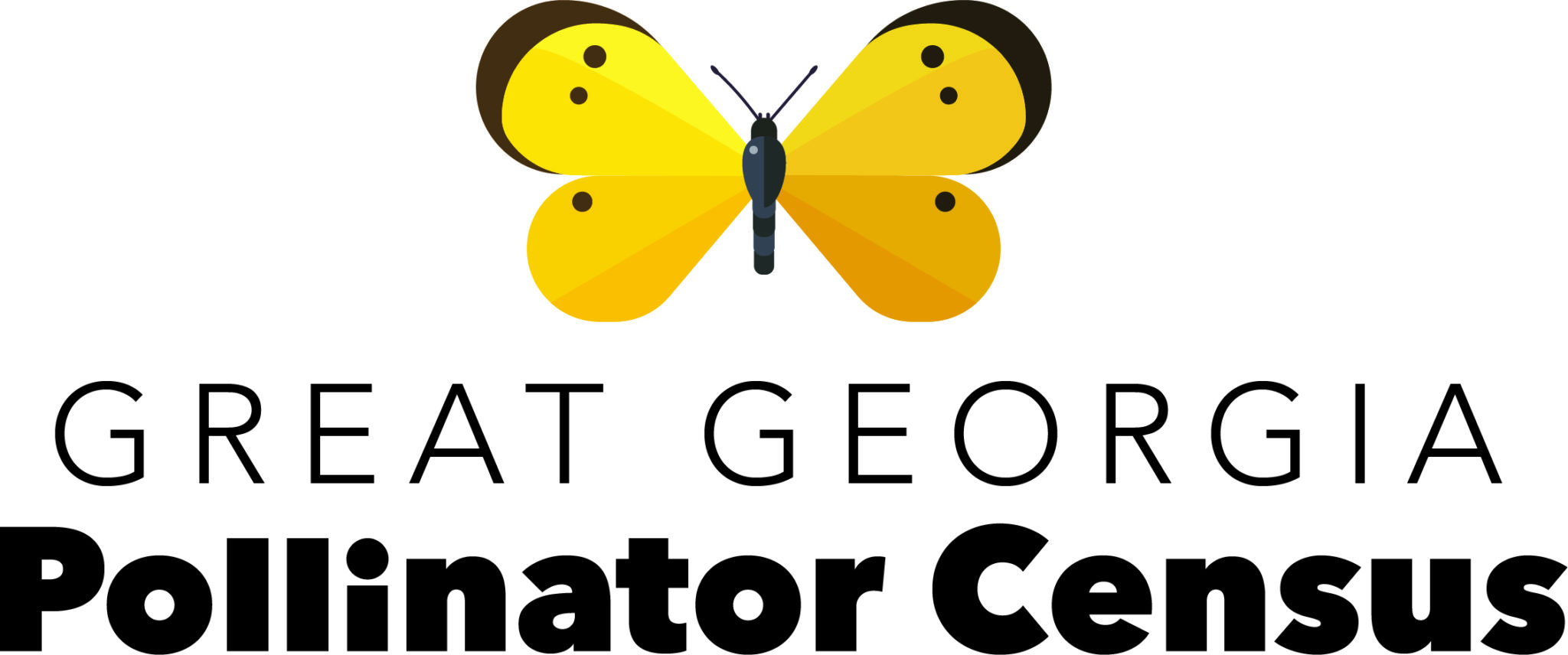August 23rd and 24th of 2019, citizens of Georgia will be conducting the first ever statewide pollinator census. This includes YOU if you live in Georgia! You will want to be a part of pollinator history!

We have been working towards this project for some time and even though it is still 14 months away, we want to make sure that every Georgia citizen has the date marked on their 2019 calendar. We have already been asked a few questions so I wanted to answer those most frequently asked:
What is the Great Georgia Pollinator Census? The Great Georgia Pollinator Census is a statewide project where all Georgia citizens will be asked to count pollinators on either August 23rd or 24th of 2019. Training and all supporting information will be provided through the website, https://GGaPC.org, closer to the August 2019 date.

How will it work? Each citizen scientist (YOU) will choose a favorite pollinator plant that is blooming in their garden for counting. You will count all the insects that land on that plant during a 15-minute period. After you tally the counts, you will upload your data to the webpage. Very simple. The data will be used for researchers to see a snapshot of which pollinators are at work in Georgia on those dates.
Do I have to be an entomologist to participate? NO, definitely NOT. We will be asking you to place the insects you see into one of eight categories:
Carpenter bees
Bumble bees
Small bees
Honey bees
Wasps
Flies
Butterflies
Other insects
The online training, conducted and posted online in 2019, will teach you how to tell the difference between flies, bees, and wasps. We will give you the tools to understand the basic skills needed to place insects in the categories. It will be very simple and straightforward. Of course, we will be available for any questions.
Can school groups participate? ABSOLUTELY! One of the reasons for the August date is to make sure school groups do participate. We will have lesson plans available for teachers use. We have conducted smaller censuses and school groups have really enjoyed the activities. The teachers can tie the census to their STEM activities.
If you are a teacher and have a lesson plan on pollinators that you want to share we would love to put the plan on our website and to feature you on upcoming social media. Just email me at beckygri@uga.edu to submit a lesson or for more information.
What about families? Can my small family participate? OF COURSE. The census is set up so that individuals can count in their gardens.
Will groups be holding special events around the census? YES, the State Botanical Garden in Athens and the Coastal Botanical Garden in Savannah have already started planning special events. Other gardens will follow. Also, contact your local UGA Extension office to see what they have planned.
Starting in January 2019 we will have supporting social media so that as you get ready for the census you will have fun, and educational, snippets to use in classrooms or in family discussions.
Why are you announcing the census so early? So that everyone can mark those dates on their calendars. And, it gives those who don’t have a pollinator garden time to design and plant one! (https://ugaurganag.com/pollinators)
What can we do now to get ready for the census? Plan and plant a pollinator garden, check the webpage and bookmark it (https://GGaPC.org), and contact me at beckygri@uga.edu if you have any questions.
Be part of Georgia pollinator history. Mark your calendar! Happy Pollinator Week 2018!
Becky Griffin

- ParSLAY the Day! - June 12, 2024
- 6th Annual Great Southeast Pollinator Census - May 28, 2024
- Are you ready for Pepper Palooza? - July 5, 2023

Excited about Pollinator Week and the Great Georgia Pollinator Census!
I’ve forward website to friends. Looking ahead to working on this census in August.
Pam Bridges
Seminole County
Thanks, Pam. I am glad you will be counting with us!
Help I need an answer please. Could you tell me if the male carpenter bee drills into wood or is it just the female
Hi! Only the females drill into the wood. She is doing this to make a nest and since males don’t lay eggs they have no need to make a nest. Also, a male carpenter bee has a white or yellow spot in the middle of their face while the female does not. This may help you with identification. I hope this helps.
I missed the 2019 census. As a bee keeper I am interested in any data source that can help us curb the negative impacts we impose on nature. I hope to participate next year
I will look forward to your counts in 2020! I hope your bees had a good summer and make it safely through the winter, Becky